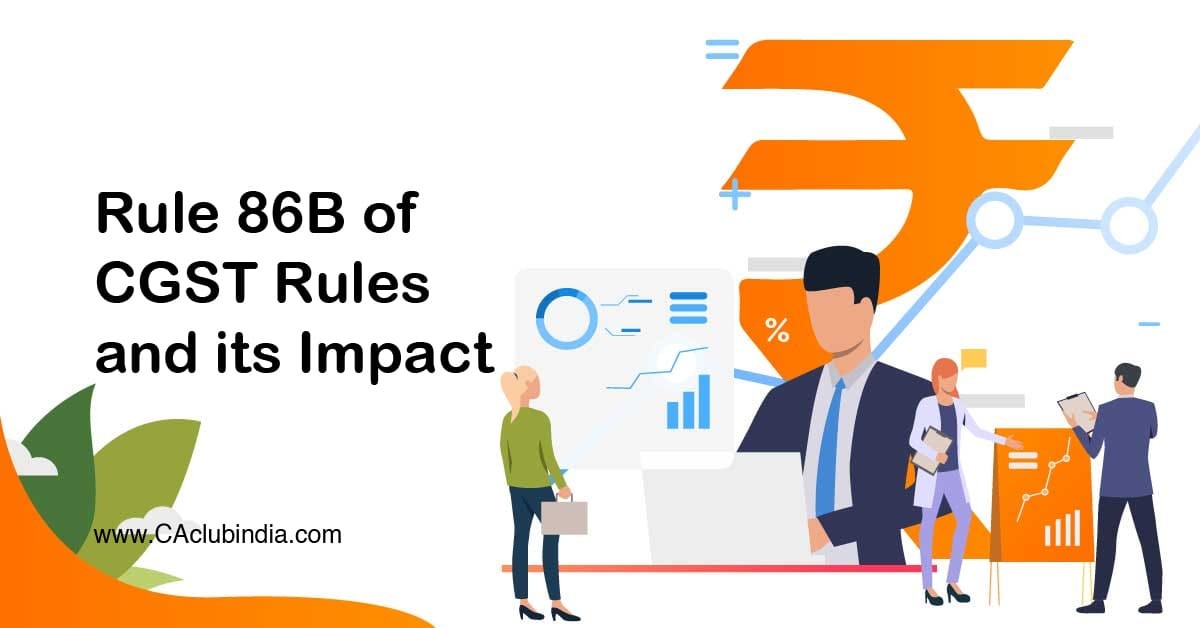The Central Government introduced the 14th amendment rules vide notification no 94/2020 dated 22.12.2020. This notification resulted in various changes in CGST Rules, 2017 which have a severe impact on various sectors. One of them is the introduction of Rule 86B which came into effect on 01.01.2020.
This rule restricts the utilization of available ITC in the electronic credit ledger of the registered person. It allows the registered person to avail ITC to pay only 99% of the tax liability. This rule has been introduced with an intention to curb unfair practices by traders to avail ITC and stop creating fake invoices to increase the turnover without any financial credibility. This rule now makes every registered person pay at least 1% of tax payable in cash which in turn generates revenue to the Government.
The amendment for this rule reads as follows:
In the said rules, after rule 86A, with effect from the 1st day of January 2021, the following rule shall be inserted, namely:
"86B. Restrictions on use of amount available in the electronic credit ledger
Notwithstanding anything contained in these rules, the registered person shall not use the amount available in electronic credit ledger to discharge his liability towards output tax in excess of ninety-nine per cent. of such tax liability, in cases where the value of taxable supply other than exempt supply and zero-rated supply, in a month exceeds fifty lakh rupees:
Provided that the said restriction shall not apply where –
(a) the said person or the proprietor or karta or the managing director or any of its two partners, whole-time Directors, Members of Managing Committee of Associations or Board of Trustees, as the case may be, have paid more than one lakh rupees as income tax under the Income-tax Act, 1961(43 of 1961) in each of the last two financial years for which the time limit to file a return of income under subsection (1) of section 139 of the said Act has expired; or
(b) the registered person has received a refund amount of more than one lakh rupees in the preceding financial year on account of unutilised input tax credit under clause (i) of the first proviso of subsection (3) of section 54; or
(c) the registered person has received a refund amount of more than one lakh rupees in the preceding financial year on account of unutilised input tax credit under clause (ii) of the first proviso of subsection (3) of section 54; or
(d) the registered person has discharged his liability towards output tax through the electronic cash ledger for an amount which is in excess of 1% of the total output tax liability, applied cumulatively, up to the said month in the current financial year; or
(e) the registered person is -

(i) Government Department; or
(ii) a Public Sector Undertaking; or
(iii) a local authority;or
(iv) a statutory body:
Provided further that the Commissioner or an officer authorised by him in this behalf may remove the said restriction after such verifications and such safeguards as he may deem fit.".
Analysis of the rule
1. This rule starts with a non-obstante clause which means that it has an overriding effect over all the other rules.
2. It is applicable to all registered persons whose value of taxable supplies other than exempt and zero rated supplies exceeds Rs. 50Lakhs except for those who are specified in 1st Proviso. The value of taxable supplies here is calculated for the month for which the tax is being paid.
3. If the value of such taxable supplies for the month exceeds the prescribed limit, the registered person can pay only 99% of the liability through ITC. TH
4. It is to be noted that clause (a) of 1st Proviso specifies the income tax to be paid in the individual capacity of the persons specified thereunder and not in the capacity of firm/ company/association/board as the case may be.
5. Income tax here includes TDS deducted and advance tax paid.
6. Clauses(b) and (c) provides relief to the registered persons who received a refund of ITC in case of "Zero rated Supplies" and "Inverted rate Supplies"(i.e; where the ITC available is higher than the output tax payable.)
7. If the cumulative tax paid by the registered person in cash in the earlier months of the financial year exceeds 1% of the ta liability which needs to be paid in cash in the current month, clause (d) gives exemption to such taxpayers.
8. Clause(d) provides relief for large taxpayers and genuine taxpayers. However, these taxpayers are affected at the beginning of the financial year as there will be no tax paid in cash at the beginning of the FY. Due to this, rule 86B will be applicable to the eligible registered persons at the beginning of the financial year and they will have to pay 1% of the liability in cash compulsorily.
9. 2nd proviso of this rule does not prescribe any criteria and leaves it to the discretion of the officer. This gives rise to uncertainty as there is no liability on the officers for any misconduct.
10. Even though this rule is introduced to eliminate unfair dealings, fake invoices and tax evasion, this will increase compliance requirements and creates difficulties to various seasonal and other traders who have a large amount of accumulated ITC which needs to be availed.
11. In the end, this rule keeps a strict vigilance on the large taxpayers and eliminates tax evasion to some extent. The micro and small enterprises will mostly be unaffected by this rule.








 CAclubindia
CAclubindia
